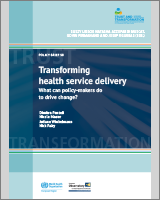From: POLICY BRIEF

NCBI Bookshelf. A service of the National Library of Medicine, National Institutes of Health.
In September 2023, the WHO Regional Office for Europe launched the report The ongoing journey to commitment and transformation: Digital health in the WHO European Region 2023, which provides a snapshot of current trends in the uptake of digital health applications across the region (WHO Regional Office for Europe, 2023a). The report builds on the regional priorities presented in the Digital Health Action Plan for 2023–2030 and the results of the 2022 Survey on Digital Health, which collected information on a set of critical digital health indicators across all 53 Member States of the WHO European Region.
The report showcases the progress made, including specific country examples, but also highlights areas in which targeted interventions are warranted to close existing gaps. The regional uptake of digital health (and what remains to be done) is explored and rests on six pillars of transformation, which reflect the main areas of policy action described in this brief:
The report also identifies enablers for transformation related to the need to strengthen existing and establish new governance structures for digital health, including: dedicated institutions at the national level; the implementation of cross-sectoral policies; and dedicated sustainable funding for the uptake of digital health solutions. On a technical level, common standards for the interoperability of data and evidence-based methods for evaluating the usefulness and safety of digital health applications should go hand in hand with these processes. Lastly, uptake may be bolstered by strengthening digital health literacy and engagement among both patients and health care workers to ensure digital inclusion and ownership of new technologies among the people working and being cared for on the ground (WHO Regional Office for Europe, 2023a).
From: POLICY BRIEF

NCBI Bookshelf. A service of the National Library of Medicine, National Institutes of Health.